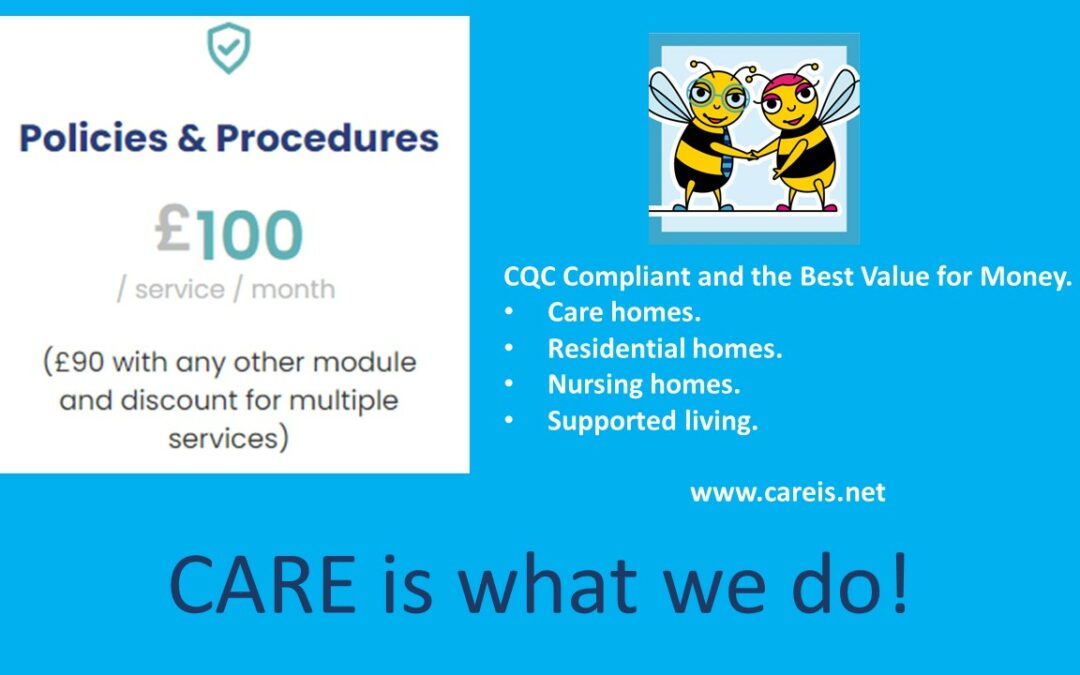All health and social care providers need a good number of care policies to demonstrate to their regulators that the care they offer is safe, caring, effective, responsive and well led, https://www.cqc.org.uk/guidance-providers/regulations-enforcement/regulations-service-providers-managers.
This means having policies and procedures which meet the standards for care as identified in the Health and Social Care Act 2008 (Regulated Activities) Regulations 2014, https://www.legislation.gov.uk/ukdsi/2014/9780111117613/contents.
There are many ways that a provider can go about getting their care policies, this includes:
- Writing them all in house.
- Copying and ‘borrowing’ them from various people
- Cobbling them together from on-line forums

- Buying them from a policy provider
While each of these is probably better than having no policies at all, there are differences in the approaches which need some examining.
Option one is very time consuming, with the average policy taking about a day to research and complete. This means a suite of care policies should easily be completed in say a year of the registered manager’s time assuming they have nothing else to do. This is an expensive option and there are no guarantees that the policies will be of a standard fit for the provision of care and compliance inspections.
Even updating care policies is time consuming with on average a couple or three policies needing updating a week and during challenging time, as we saw in COVID, almost daily! Again time is expensive and the do it yourself approach is likely to lead to problems with an incomplete policy suite and policies which are not fit for purpose.

Then there is the question of whether the policies are up to standard, which is not something the manager will find out until they need to apply them in practice, out of hours or when they have an inspection from the local authority or their regulator.
So perhaps do it yourself needs to be restricted to a bit of painting and wall papering at home?
There are similar problems with getting policies from your mates, online forums and via popular search engine searches…. How do you know what you have is:
- good quality
- up to date
- contains what it needs to
- will work for you and your team?
Of course borrowed, or stolen, policies also need some work with formatting and ensuring they refer to your service, rather than the service of some other provider. It is not uncommon for inspectors to find borrowed policies have reference to the wrong service, the wrong local authority and the wrong safeguarding team contact details.
This is all time consuming and at the end of that time what’s the result?
But hey, its cheap….. which is exactly what the regulator or your lawyer will say when your policies fail you and the people you care for. Just don’t do it. It’s a false economy.
 In an online discussion a few weeks ago I was told that you should not buy care policies from providers because they are too generic. Is this right? And if it is, is it a problem?
In an online discussion a few weeks ago I was told that you should not buy care policies from providers because they are too generic. Is this right? And if it is, is it a problem?
Here’s what we think at CAREis. No and, no.
First, are care policies from providers generic? Well actually yes some are, but then so too are NICE guidelines, SCIE guidance and every piece of legislation ever. Why, because they need to be, that’s why.
So a policy about about treating a service user for a head injury, doing CPR, catheter care or providing person-centred care is going to be generic because in every situation when carers are doing these things the basis of what they need to do is the same.
Why, well because they are driven by evidence, good practice guidelines and regulation. It’s not open to negotiation or interpretation.
Does that means they are generic, well yes and no. Most providers of care policies and procedures, enable the purchasing service to make some amendments and additions to make them personal to the service.
At CAREis, https://www.careis.net/features/, for example our care policies are created so services can identify their registered manager, safeguarding and GDPR leads with contact details etc. This means some bits are generic and others reflect what the service’s details.
We also have a text box for services to personalise content where they feel the need. So they are generic, but not in a bad way.
There is another reason they are generic, that is because those of us who write care policies also know that there are things we have to include in certain policies. These then appear in all similar policies created by ALL care policy providers who know what they are doing. So generic in a good way.

Does this matter? Well yes in a good way and no in reality.
Yes because it means that policies which are out and about and in use identify good practice and can be used to underpin that – good way.
Yes because care policies provided by good policy agencies have been seen and tried and tested at inspections, so they work – good way.
And so in reality it does not matter that they are generic care policies, they do what they need to do.
So now most providers have here a number of good reasons they should use a policy provider.
Here are some reasons to choose CAREis policies:
- Policies at CAREis cover everything the Registered Manager and Nominated individual need from HR to clinical and safeguarding to financial controls.
- CAREis Policies are all accessible to all staff 24/7 online.
- CAREis Policies can be printed out.
- CAREis Policies can be personalised to the service by the service.
- CAREis Policies can be shared remotely with inspectors and commissioners.
- CAREis Policies are written to be easy to understand and provide staff with the guidance they need when they need it.
- CAREis Policies are divided up so staff can find what they want, they are not long tomes which are scary to read.
- CAREis Policies have been through many inspections.
- CAREis Policies are regularly updated.
CAREis Policies are only £100 a month or £90 if you subscribe to any other module, https://www.careis.net/pricing/.
If you’re interested give us a call or drop us a line at CAREis, https://www.careis.net/book-a-remote-demo/.
